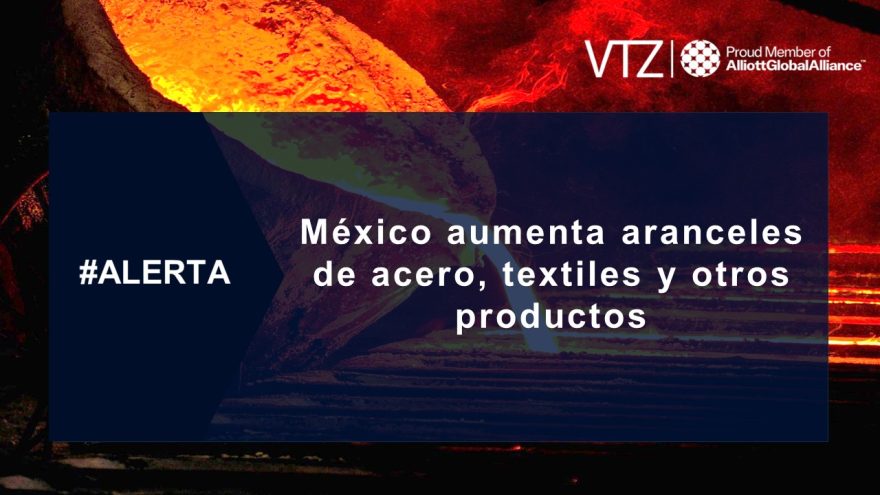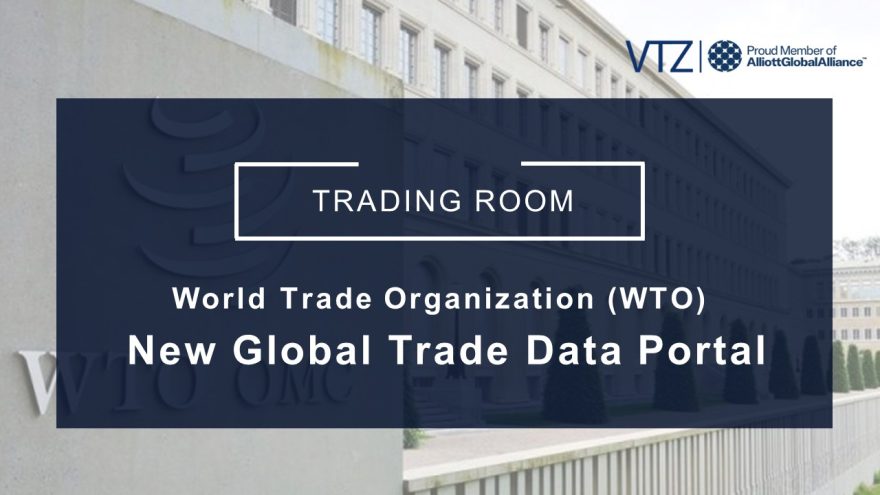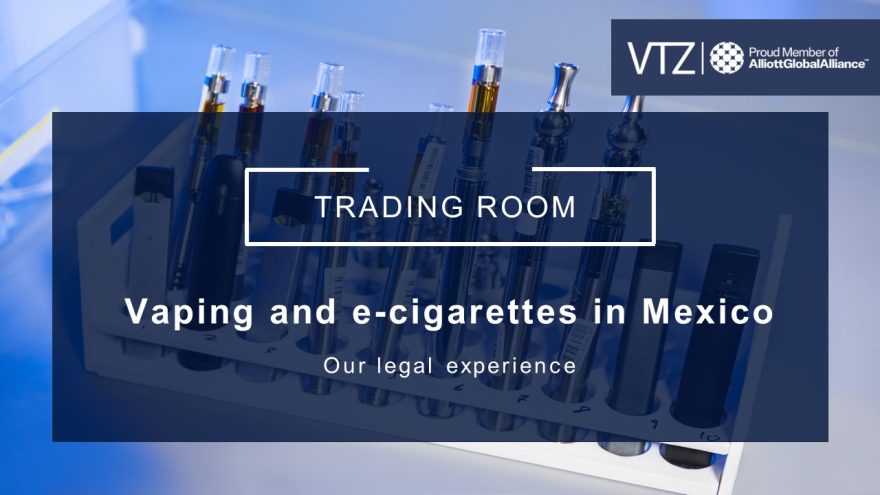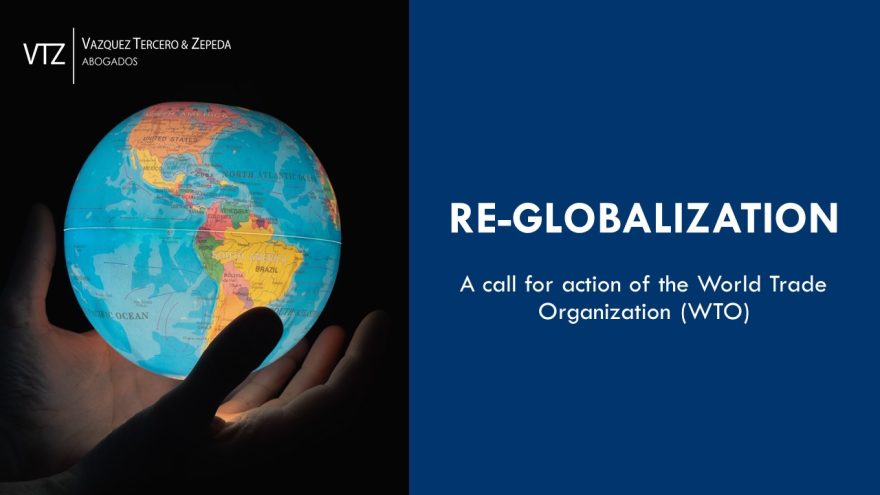México aumenta aranceles en productos de acero, textiles y otros
El 15 de agosto de 2023, el Presidente emitió el Decreto por el que se modifica la Tarifa de la Ley de los Impuestos Generales de Importación y de Exportación. Este decreto tiene numerosas implicaciones económicas, comerciales y políticas que afectan a la economía del país, la producción nacional y las empresas importadoras de diversos productos, así como los exportadores en extranjero en países sin tratado de libre comercio con México. Además, VTZ se congratula de compartirte que este resumen fue citado por la Revista U.S. Inside Trade en su análisis de este aumento arancelario.
¿En qué consiste este Decreto donde México aumenta aranceles?
En general, este Decreto en donde México aumenta aranceles impactará el comercio de cientos de productos. Para ser más específicos, el decreto aumenta el arancel de importación aplicable a 392 fracciones arancelarias. Prácticamente, todos los productos de esas fracciones arancelarias están ahora sujetos a un arancel de 25%, salvo ciertos textiles que tendrán uno del 15%.
Los principales productos que se verán impactados son el acero, aluminio, bambú, caucho, productos químicos, aceites, jabón, papel, cartón, productos cerámicos, vidrio, material eléctrico, instrumentos musicales y muebles. Esta modificación puede tener diversos efectos en la economía nacional. También, destacamos que el decreto impactará las relaciones comerciales y los flujos de mercancías entre México y sus socios comerciales sin tratado de libre comercio porque aumenta los costos de importar ciertos productos. Por ejemplo, productos de Brasil*, China, Corea del Sur, Taiwán e India serán los más afectados.
México modifica aranceles a 483 productos para apoyar a la industria 🇲🇽👀
— El Economista (@eleconomista) August 16, 2023
¡Entérate! 👇 https://t.co/5lfOG9UmvM
Al incrementar aranceles, la modificación a la TIGIE evidentemente aumenta los precios de los productos importados, lo que se traduce en mayores precios finales para los consumidores industriales o finales. Simultáneamente, aranceles más altos puede brindar “protección” a las industrias locales frente a la competencia extranjera.
¿Mayor protección para productos con cuotas compensatorias o sujetos a investigaciones antidumping?
VTZ destaca que hay ciertas industrias que se verán particularmente «beneficiadas” por este decreto que aumenta aranceles. Específicamente, nos referimos a los productos que están sujetos a una investigación antidumping activa en México o cuotas compensatorias.
Por un lado, la Secretaría de Economía investiga actualmente las importaciones de bolas de acero de China, las llantas de automóvil de China, también está realizando un examen de vigencia y de revisión de las cuotas compensatorias de tubería de acero sin costura de Corea Todos estos productos están listados en este decreto que aumenta aranceles.
The #Economy Ministry announced Tuesday that #tariffs will increase on 483 #imported products, including steel, aluminum, bamboo and furniture.https://t.co/mp4N4vDdsR
— Mexico News Daily (@mexicond) August 17, 2023
En cuanto a productos listados en el Decreto con cuotas compensatorias, nosotros destacamos que las importaciones de acero inoxidable de China y Taiwán, lámina rolada en frío de Corea, lámina rolada en frío de China, aceros planos recubiertos de China y Taiwán, tubería de acero de Corea, India y Ucrania, entre otros, resentirán los efectos de este aumento de aranceles.
¿Qué empresas y países se verán afectados por el decreto que aumenta aranceles?
Un punto importante sobre esta modificación a la TIGIE es que impactará a todos los productos, salvo aquellos que sean originarios de países con los que México tiene un tratado de libre comercio (TLC). En otras palabras, las mercancías originarias de Estados Unidos, Canadá, la Unión Europea, Vietnam, Japón, Singapur, entre otros, no tendrán que pagar este arancel, siempre y cuando tengan su certificado de origen. Los productos de esos orígenes seguirán beneficiándose de la tarifa o arancel preferencial previsto en el tratado. Además, este decreto contiene ciertas consideraciones que requieren un análisis especializado en cuanto a las importaciones bajo el programa PROSEC.
Esta modificación a la tarifa arancelaria entró en vigor el 16 de agosto de 2023 y concluirá su vigencia el 31 de julio de 2025. Es decir, este decreto que aumenta aranceles estará vigente durante prácticamente dos años. Por tanto, esta nueva tarifa es aplicable en este momento.
¿Por qué México decidió incrementar sus aranceles?
Ahora bien, la razón por la que se decidió modificar la TIGIE proviene de dos situaciones. Por un lado, el Presidente señala que actualmente existe un exceso de capacidad mundial de producción de acero, lo que agrava las presiones para colocar los excedentes de la producción nacional. Por otro lado, el Decreto menciona que la industria textil, de confección y de calzado se ha visto afectada por la desaceleración en el crecimiento económico derivada de la pandemia, por lo que requiere apoyo para estabilizarse. En adición, el tipo de cambio entre el peso mexicano (MXN) y el dólar estadounidense (USD) pudo ser otro factor tomado en cuenta para esta modificación.
En consecuencia, el Presidente consideró que era necesario realizar este aumento de aranceles para brindar certidumbre y condiciones de mercado justas a todos los sectores que enfrentan situaciones de vulnerabilidad, permitir la recuperación de la industria, fomentar su desarrollo y apoyar el mercado nacional.
Conclusión
En conclusión, el decreto que aumenta aranceles tiene un impacto directo en los precios de los productos importados, lo que puede influir en los consumidores industriales y finales. Si bien este decreto no es una medida de salvaguarda, el incremento de aranceles responde a la alegada necesidad de abordar desafíos específicos que enfrentan ciertos sectores industriales.
Este tipo de medidas resalta la importancia de tener fuentes de suministro que provengan de países con tratados de libre comercio; también, las empresas IMMEX deberán tener especial cuidado con el control de sus inventarios de sus importaciones temporales y el cumplimiento con las reglas de diferimiento de aranceles de mercancías no originarias artículo 2.5 del TMEC.
Evidentemente, los exportadores extranjeros e importadores nacionales de productos asiáticos deben tomar en cuenta este incremento arancelario para sus negocios actuales y futuros en México. En caso de que requieran una asesoría o explorar otras alternativas, no duden en contactar a nuestro equipo
¿Quieres más información?
VTZ es un despacho especializado en Comercio Exterior y Aduanas con amplia experiencia de comercio internacional, impuestos de importación, y la industria siderúrgica.











